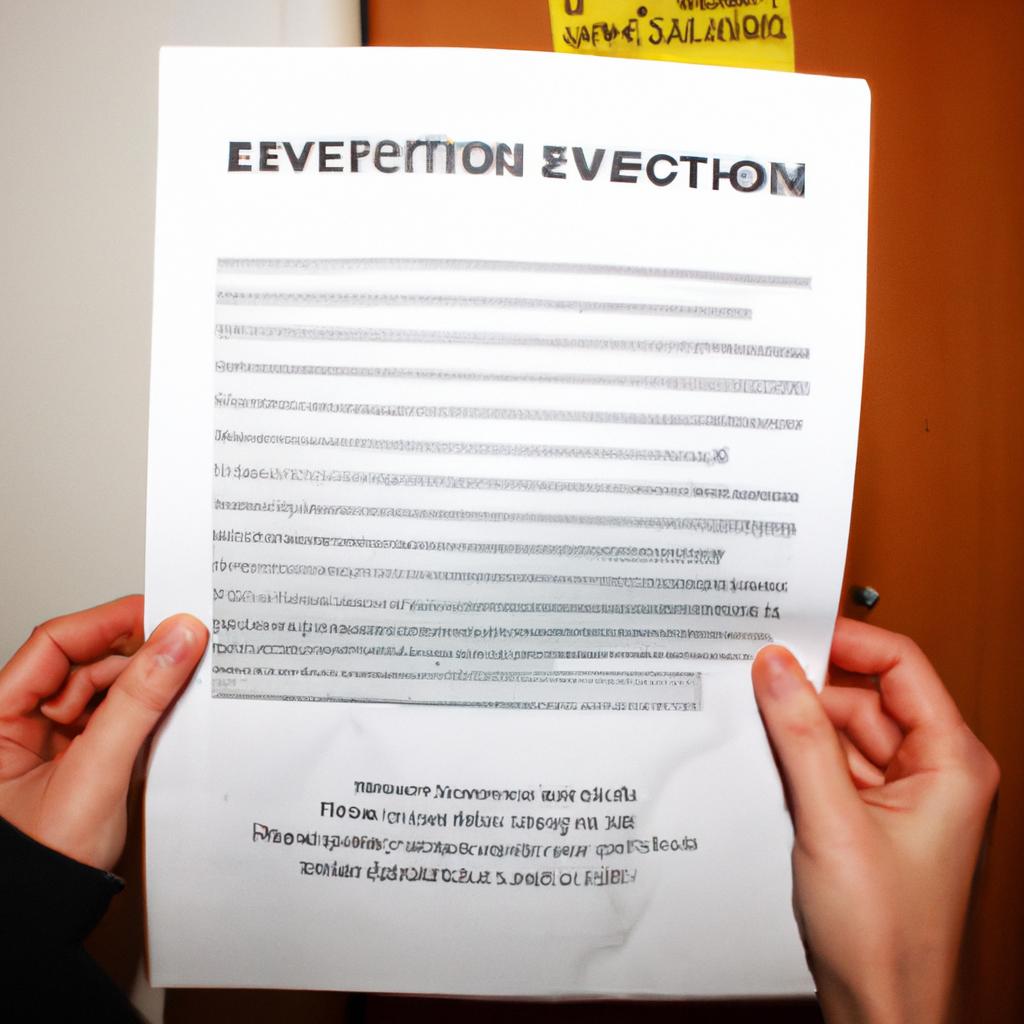Evictions in the real estate business have become a significant concern for property management. The process of removing tenants from rental properties due to non-payment or breach of lease agreements can be complex and time-consuming. One example that illustrates the gravity of this issue is the case study of an apartment building in downtown Chicago, where multiple tenants were consistently delinquent on their rent payments, leading to financial strain for the property owner and disruption among other residents.
In recent years, there has been a noticeable increase in evictions within the real estate industry. This growing trend raises questions about the effectiveness of current eviction processes and highlights the need for property managers to navigate these situations with both efficiency and empathy. Understanding the legal requirements, protocols, and best practices surrounding evictions is crucial not only for protecting landlords’ interests but also for maintaining healthy tenant-landlord relationships and ensuring smooth operations within rental properties. Therefore, this article aims to provide a comprehensive guide for property management professionals regarding evictions, offering insights into relevant laws and regulations, strategies to prevent eviction scenarios when possible, as well as steps to follow when it becomes necessary to initiate eviction proceedings.
Understanding the eviction process
Understanding the Eviction Process
One of the most challenging aspects of property management in the real estate business is handling evictions. It can be a complex and emotionally charged process for both landlords and tenants. To navigate this often tricky terrain, it is crucial to have a comprehensive understanding of the eviction process.
Consider this hypothetical scenario: A tenant named John has fallen behind on his rent payments for several months due to financial difficulties. Despite repeated attempts by the landlord to communicate and find a solution, John has been unable to catch up on his rental obligations. As a result, the landlord decides to initiate an eviction process.
Before delving into the intricacies of evictions, it is important to recognize that there are emotional consequences for all parties involved. The following bullet points highlight some common emotions experienced during an eviction:
- Frustration: Both landlords and tenants may feel frustrated when faced with non-payment or other breaches of lease agreements.
- Anxiety: Tenants facing eviction may experience anxiety about finding another suitable place to live, while landlords worry about potential financial losses.
- Anger: Disputes between landlords and tenants can escalate into anger when communication breaks down.
- Stress: Dealing with legal proceedings and paperwork related to evictions can cause significant stress for everyone involved.
To provide further clarity, let’s examine a table outlining key stages in the eviction process:
| Stage | Description | Timeframe | Emotional Impact |
|---|---|---|---|
| Notice | Landlord serves written notice indicating breach | Typically 3-30 days | Tension and uncertainty |
| Filing Lawsuit | If tenant fails to comply, landlord files lawsuit | Varies (days or weeks) | Heightened anxiety |
| Court Hearing | Tenant receives notice of court date | Usually within a month | Increased stress |
| Enforcement | If judgment is in favor of the landlord, eviction occurs | Varies (days or weeks) | Emotional upheaval |
In conclusion, understanding the eviction process is essential for successful property management. By recognizing the emotional impact on landlords and tenants alike, we can approach this topic with empathy and clarity.
Transition to subsequent section about “Legal obligations for landlords”: With a solid grasp of the eviction process, it becomes imperative to navigate these proceedings while adhering to one’s legal responsibilities as a landlord.
Legal obligations for landlords
Understanding the eviction process is crucial for property managers to effectively navigate the complex world of real estate. By having a clear understanding of this process, landlords can protect their rights and ensure a smooth operation of their properties. This section will delve deeper into the legal obligations that landlords must fulfill when it comes to evictions.
To illustrate these obligations, let’s consider an example scenario: Imagine a tenant who consistently fails to pay rent on time despite multiple reminders from the landlord. In such cases, landlords have the right to initiate an eviction process in order to regain possession of their property.
When considering evictions in real estate business, there are several key legal obligations that landlords should be aware of:
- Proper Notice: Before initiating an eviction, landlords must provide tenants with proper notice as required by law. The specific notice period may vary depending on local regulations or lease agreements.
- Just Cause: Landlords typically need to demonstrate just cause for initiating an eviction, such as non-payment of rent, violation of lease terms, or illegal activities conducted on the premises.
- Fair Housing Laws: Landlords must ensure they comply with fair housing laws during the eviction process, which prohibit discrimination based on race, color, religion, sex, national origin, familial status, or disability.
- Procedural Requirements: Landlords must follow all procedural requirements stipulated by local laws when filing for eviction. Failure to adhere to these requirements could result in delays or even dismissal of the case.
Table 1 provides an overview of common reasons for evictions and corresponding examples:
| Reason for Eviction | Example Scenario |
|---|---|
| Non-payment of Rent | Tenant repeatedly fails to pay rent within specified period |
| Lease Violation | Tenant sublets property without permission |
| Property Damage | Tenant causes significant damage beyond normal wear |
| Illegal Activities | Tenant conducts drug-related activities on the premises |
Understanding these legal obligations is crucial for landlords to ensure that their eviction processes are carried out in a fair and lawful manner. By doing so, they can protect both their rights as property owners and maintain positive tenant relationships.
In the subsequent section about steps to take before initiating an eviction, we will explore proactive measures landlords can undertake to potentially resolve issues without resorting to evictions.
Steps to take before initiating an eviction
Before proceeding with an eviction, landlords must ensure that they have fulfilled certain requirements and taken necessary steps. By doing so, they can protect their rights as property owners while also adhering to legal obligations. Let’s explore the key measures that should be implemented prior to initiating an eviction.
One example of a crucial step is attempting mediation or negotiation with the tenant in question. For instance, let us consider a hypothetical scenario where a landlord has a tenant who consistently fails to pay rent on time. Rather than resorting immediately to eviction proceedings, the landlord could first engage in open communication with the tenant regarding their financial difficulties. This initial attempt at resolving the issue amicably may help avoid unnecessary legal complications.
To provide further guidance, here are some essential steps for landlords before moving forward with evictions:
- Conduct thorough documentation: Keep detailed records of all interactions, notices served, and relevant communications between both parties.
- Review lease agreements: Carefully analyze the terms outlined in the lease agreement, paying close attention to clauses related to non-payment of rent or breach of contract.
- Seek legal advice: Consult with an attorney specializing in real estate law to fully understand your rights and responsibilities as a landlord.
- Confirm compliance with local laws: Familiarize yourself with specific regulations governing evictions in your jurisdiction, ensuring proper adherence throughout the process.
| Steps to Take Before Initiating an Eviction |
|---|
| 1. Conduct thorough documentation |
| 2. Review lease agreements |
| 3. Seek legal advice |
| 4. Confirm compliance with local laws |
Implementing these steps not only demonstrates good faith efforts by landlords but also helps establish strong groundwork for any future legal action if required.
With these preparatory measures in place, it becomes imperative for landlords to gather the necessary documentation required for an eviction process while maintaining compliance with legal procedures.
Documentation required for an eviction
In the case of a tenant who consistently fails to pay rent, it is essential for property management companies to follow certain steps before initiating an eviction. These preliminary actions are crucial in ensuring that the eviction process is conducted smoothly and within legal boundaries.
Firstly, communication with the tenant should be prioritized. Property managers should make efforts to understand any underlying reasons behind the non-payment of rent. By engaging in open dialogue, they may uncover unexpected circumstances such as job loss or financial hardship that can potentially be resolved through negotiation or alternative payment arrangements.
Secondly, property managers need to review their lease agreements thoroughly. It is important to ascertain whether there are any clauses related to late payments or default on rent. Understanding these contractual obligations will provide clarity on what actions can be taken and how long the grace period is before eviction proceedings begin.
Thirdly, documentation plays a critical role in proving the legitimacy of an eviction case. Property managers must maintain accurate records of all communication and notices sent to tenants regarding unpaid rent. This includes keeping copies of written correspondence (such as demand letters) and maintaining detailed logs of phone conversations or meetings held with the tenant.
To illustrate further, consider a hypothetical scenario where a property manager discovers that a tenant has failed to pay rent for three consecutive months despite multiple reminders and warnings. In this situation:
- The property manager communicates directly with the tenant to inquire about their financial difficulties.
- Upon reviewing the lease agreement, it becomes evident that there is no provision for late payment forgiveness after 30 days.
- The property manager maintains meticulous records of all attempts made to communicate with the tenant regarding outstanding rent, including dates and times of phone calls, emails, and face-to-face meetings.
By following these steps diligently, property management companies can demonstrate due diligence while also providing opportunities for resolution before resorting to evictions. Handling each case individually ensures fairness while adhering to legal requirements.
Next, we will explore the documentation required for an eviction and how it contributes to the overall process.
Handling tenant disputes during evictions
In the process of evicting a tenant, property managers may encounter various disputes and conflicts. These conflicts can arise due to misunderstandings, disagreements over lease terms, or non-compliance with eviction notices. It is crucial for property managers to handle these disputes in a fair and professional manner to ensure a smooth and lawful eviction process.
Case Study:
To illustrate the challenges that can be faced during an eviction, consider the following hypothetical scenario: A tenant has fallen behind on rent payments for several months. The property manager has issued multiple warnings and served them with an eviction notice as per local regulations. However, instead of vacating the premises, the tenant contests the eviction, claiming they have made partial payments which were not accounted for by the landlord. This dispute requires careful resolution to avoid unnecessary delays and potential legal complications.
Tenant Dispute Resolution Strategies:
- Mediation: In cases where tenants refuse to leave despite valid reasons for eviction, mediation can offer an opportunity for both parties to reach a mutually agreeable solution. Engaging a neutral third party can help facilitate discussions and negotiations between the tenant and property manager.
- Documentation Review: Property managers should thoroughly review all relevant documentation pertaining to rent payment history, communication records, and any agreements made during previous interactions with the tenant. Providing clear evidence of non-payment or violations of lease terms strengthens their case during disputes.
- Communication Channels: Establishing effective lines of communication is essential when dealing with tenant disputes during evictions. Promptly addressing concerns raised by tenants through email or written correspondence helps maintain transparency and fosters goodwill even in challenging situations.
- Legal Assistance: Seeking legal advice from professionals experienced in real estate law can provide valuable guidance throughout contentious eviction processes. Lawyers specializing in landlord-tenant relationships can offer insights into local regulations while ensuring compliance with legal procedures.
Table – Emotional Impact Factors During Tenant Disputes:
| Emotional Impact Factors | Examples |
|---|---|
| Stress | Uncertainty about the future, financial strain |
| Anxiety | Fear of losing housing, potential legal consequences |
| Frustration | Delays in resolving disputes, breakdown of communication |
| Anger | Perceived unfair treatment or breaches of agreement |
Navigating tenant disputes during evictions can be a complex and emotionally charged process. It is crucial for property managers to approach these situations with professionalism, empathy, and a commitment to following established procedures. By employing mediation techniques, reviewing documentation, maintaining open lines of communication, and seeking legal assistance when necessary, property managers can effectively handle tenant disputes while ensuring a smooth eviction process.
As property managers strive to resolve conflicts during evictions, it is important to consider post-eviction procedures and considerations that play a vital role in efficiently managing the property.
Post-eviction procedures and considerations
Handling tenant disputes during evictions can be a challenging aspect of property management. It is important for property managers to approach these situations with professionalism and a commitment to resolving conflicts in a fair and equitable manner. In this section, we will explore effective strategies for managing tenant disputes during the eviction process.
One example that illustrates the complexities of handling tenant disputes during evictions is the case of Smith Apartments. Mr. Johnson, a long-term tenant, fell behind on his rent due to unexpected medical expenses. The property manager, Ms. Thompson, initiated an eviction process but was met with resistance from Mr. Johnson who claimed he had been unfairly treated. This situation required careful navigation to ensure both parties were heard and their concerns addressed.
To effectively manage tenant disputes during evictions, consider the following strategies:
- Open lines of communication: Establishing clear channels of communication between the property manager and tenants can help address issues before they escalate into full-blown disputes.
- Mediation or arbitration: If tensions rise between the landlord and tenant, involving a neutral third party mediator or arbitrator can provide an opportunity for both sides to express their grievances and work towards finding mutually agreeable solutions.
- Documentation: Maintaining thorough documentation throughout the eviction process is essential. Keep records of all interactions, notices served, and any evidence presented by either party.
- Legal guidance: Seek legal advice when necessary to ensure compliance with local laws regarding eviction procedures and dispute resolution processes.
The table below highlights some common reasons for tenant disputes during evictions along with suggested approaches for resolution:
| Dispute Reason | Suggested Approach |
|---|---|
| Non-payment of rent | Offer payment plan options |
| Property damage | Conduct joint inspections |
| Lease violations | Provide written warnings |
| Harassment | Investigate claims thoroughly |
In conclusion, successfully managing tenant disputes during evictions requires effective communication, mediation or arbitration when necessary, proper documentation, and seeking legal guidance when appropriate. It is important for property managers to approach these situations with empathy while upholding their responsibilities as landlords. By employing these strategies, property managers can navigate tenant disputes in a fair and professional manner, fostering positive relationships within the real estate business.




